What is the role of pastors in politics?
By Starla Muhammad -Assistant Editor- | Last updated: Dec 9, 2015 - 9:18:25 AMWhat's your opinion on this article?
Trump meeting with Black clergy ignites firestorm of backlash, debate
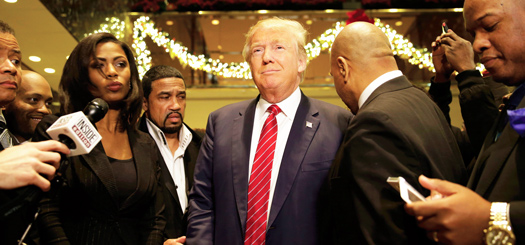
Republican Presidential candidate Donald Trump, center, joins a group of Black religious leaders to speak to reporters in New York, Nov. 30. Trump met with a coalition of Black evangelical pastors and religious leaders in a private meeting at Trump Tower.
|
The controversy and subsequent fallout from a meeting between a group of Black clergy and Republican presidential candidate Donald Trump not only reignited conversations on the role of clergy in politics but also raised more questions than answers on the motive and purpose of the private gathering.
Some argued it is necessary for Blacks to meet and work with political candidates of both parties. But critics questioned why the group who were dubbed on a flier publicizing the event as a “Coalition of African American Ministers” would agree to meet with a man whose xenophobic remarks about Blacks, Latinos, Muslims and callous remarks about women are well-documented.
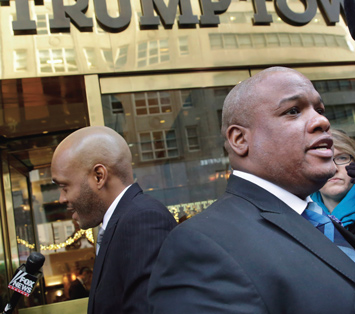
Pastor Mark Burns, co-founder & CEO of Christian Television Network, from Easley, S.C., right, speaks to the members of the media outside Trump Tower in New York, Nov. 30.
|
“Fredrick Douglass said power concedes nothing without a demand. As pastors, as prophets we can’t just be honored to be in the room,” said Dr. Jamal Bryant, pastor of Empowerment Temple AME Church in Baltimore. Clergy should shoulder the weight, pain and problems of the people they serve, he told The Final Call.
“So to walk out of that room not having asked of anything; the reality is, as a billionaire Donald Trump don’t have to wait till he’s president to do something for people. Create jobs now, develop something now. So I think for them to go in and just honored to be there without a demand, not a request, a demand—is really full grade prostitution,” said Dr. Bryant.
Pastors, progress and politics
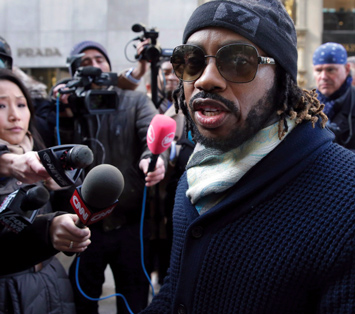
Dr. Victor Couzens of the Inspirational Baptist Church, from Forest Park, Ohio, arrives at Trump Tower in New York, Nov. 30.
|
“In many instances black clergy became the spokespeople for campaigns articulating the grievances of black people, and they became the strategists who shaped the objectives and methods of the movement that sought to redress those grievances. Furthermore, they were able to win the allegiance of a large number of people and convince them to make great sacrifices for racial justice,” notes an article by Dr. Clarence Taylor titled, “African American Religious Leadership and the Civil Rights Movement.” Back then, pastors would relay to their congregants that participation in the fight for civil rights was an historic and religious mission and their work netted results, explained Dr. Taylor, a professor in the Department of Black and Latino Studies at Baruch College in New York.
“For example, in a 1963 campaign to force the state of New York and the building-trade unions to hire black and Hispanic construction workers at the Downstate Medical Center in Brooklyn, ministers involved in the struggle told their congregations that they were part of a moral and patriotic movement to make America more democratic,” continued Dr. Taylor. At that time, Rev. Gardner C. Taylor of Concord Baptist Church in Brooklyn declared in an address to 6,000 people that “There will be no turning back until people in high places correct the wrongs of the nation,” he continued. Some clergy even opted to throw their hat into the political arena.
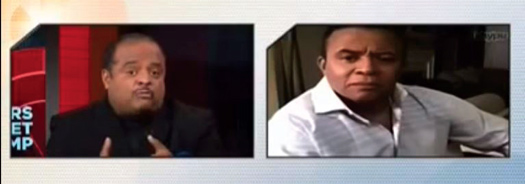
A screen shot of an interview between Roland S. Martin (left), host of NewsOne Now and Dr. Steve Parson, pastor of Richmond Christian Center. Dr. Parson’s conceded no policy or agenda issues were presented by the clergy that met with GOP presidential candidate Donald Trump on Nov. 30. Mr. Trump did not offer an apology for disparaging remarks he has made about Blacks and other groups.
|
The first Black person to serve in U.S. Congress, Rev. Hiram Rhodes Revels was a pastor in the African Methodist Episcopal (AME) Church and filled a vacant Republican U.S. Senate seat in 1870. Rev. Richard H. Cain, another AME pastor served in Congress during Reconstruction after the Civil War and Rev. Adam Clayton Powell Jr., served in Congress from 1953-1963. In 1984 and 1988, Rev. Jesse Jackson Sr., ran for president of the United States as a Democrat. Congressman Bobby Rush (D-Ill.), a former Black Panther and ordained minister has been a member of Congress since 1993.
Dr. King and others used their bully pulpit to push both Presidents John F. Kennedy and later Lyndon B. Johnson to publically acknowledge the brutality and discrimination Blacks faced and he was a key figure in the eventual signing of resulting Civil and Voting Rights legislation passed by Congress in 1964 and 1965.
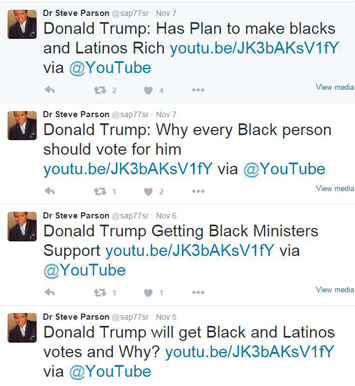
Tweets from the alleged Twitter account of Dr. Steve Parson who was one of a group of Black pastors that met with Republican presidential candidate Donald Trump. Dr. Parson’s has spoken favorably of Mr. Trump.
|
The role and influence of Black clergy in politics lost focus and effectiveness over time. The advent of “prosperity preaching” has a lot to do with this, said Dr. Raymond Winbush director of the Institute for Urban Research at Morgan State University. Historically there were pastors like Reverend Ike and others who focused on material wealth, but they were few and far between.
“The so-called prosperity ministry have really eclipsed social ministry of the Black church. You see in cities all over the country, these so-called prosperity ministries gobbling up smaller churches,” said Dr. Winbush.
In the late 70s and early 80s these types of ministries accelerated and by the 90s there was a diminishing of the social justice movement in churches, he continued. A shift also occurred when churches began receiving federal funds.
“You have Black churches now that are getting federal funds for daycare centers, drug treatment centers, for senior citizen homes and see with that, you start linking yourself with the government and then that means that you have to be more neutral in your political stance, as opposed to Dr. King and Ralph Abernathy or C.T Vivian, back in the Civil Rights era. Now you have the Black minister who can be bought by White politicians.”
Understanding Blacks are more liberal on economic issues but conservative on social issues, White evangelicals took notice. In the mid-1990s the Samaritan Project, introduced by the Christian Coalition of America, a White, and conservative group as part of their strategy for “minority outreach’ urged Congress to pass bills allocating money and tax credits to urban communities to promote social issues more in line with typically conservative views.
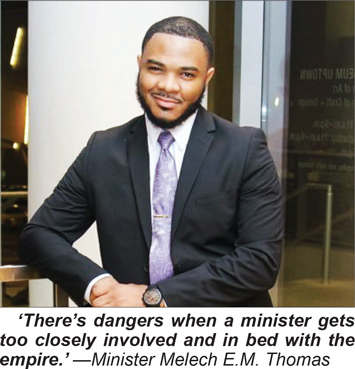
|
“These ministers that met with Donald Trump come out of that tradition; they don’t come out of the civil rights, social justice movement. They come out of the tradition; look at church as a business, look at ministry in terms of money and I can believe that Trump is going to do something for those Black ministers that do support him,” said Dr. Winbush.
However, there are those today that are using their activism to make demands of those in office or seeking office, echoing traditions of Black clergy of the past.
Rev. Bryant is organizing meetings with Black clergy from Protestant denominations and is scheduled to meet with Democratic presidential candidates Bernie Sanders this month and Hilary Clinton within the next 45 days.
Those meetings will focus on three specific areas of criminal justice, education and economic development, explained Dr. Bryant. Under those categories issues of racial profiling, aggressive policing, substandard education in public schools in urban areas, lack of funding for Historically Black Colleges and Universities, disproportionate funding allotted to special education programs versus gifted and talented programs, capital for entrepreneurship and Black businesses and predatory lending and trade with Africa are just a few of the issues to be discussed.
The effect of mercury-tainted vaccines on Black children, an issue brought to the forefront of the Justice Or Else! Movement convened by Nation of Islam Minister Louis Farrakhan will also be presented, said Dr. Bryant who was an organizer for the 10.10.15 mass gathering in Washington, D.C.
No policy, no plan?
Details of the Trump meeting was a mixed bag of confusion and no detailed strategy, agenda or proposed policy considerations was presented by the pastors to Mr. Trump nor did he present any proposals or solutions.
Everything including the exact number of pastors that attended the two and a half hour meeting at Trump Tower in New York on Nov. 30 has been mired in generalities by organizers.
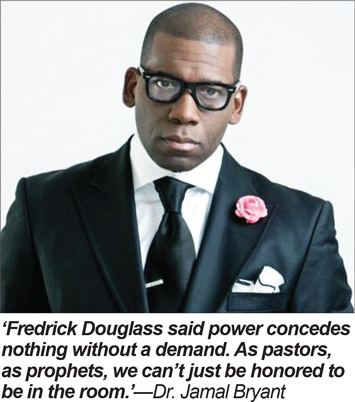
|
“The lead pastor who was the convener, Bishop Darrell Scott is out of Cleveland, Ohio and for a year we have been championing for justice for Tamir Rice’s family and he’s been nowhere,” said Dr. Bryant referring to the 12-year-old Black youth gunned down by Cleveland police while playing with a toy gun in a park.
The Final Call reached out to Dr. Scott but was informed he was not granting interviews. But he spoke to reporters after the Trump meeting and said the group of pastors “voiced concerns that were sensitive to the African American community.”
Speaking to the press, Dr. Scott said no one emerged from the meeting with a negative reaction before adding, “everybody in that room likes Donald Trump.” Reportedly this was the third meeting that Mr. Trump had with Black clergy while campaigning.
Bishop Victor Couzens of Inspirational Baptist Church seemed less than impressed with Mr. Trump after the meeting. He told veteran journalist Roland S. Martin, managing editor and host of NewsOne Now, he went looking for substance.
“This man is talking about being the president of the free world and I needed substance, I needed some real stuff to come out of the meeting that I felt like was going to impact all communities for the betterment. I needed an understanding of why he could continue to be so demeaning to minorities and feel safe about this within the context of his own spirituality and for me, I didn’t get it,” said Bishop Couzens.
The Final Call also reached out to the Reverends Omarosa O. Manigault, most recognized from her days as a contestant on Mr. Trump’s TV show “The Apprentice,” Bishop George Bloomer of Bethal Family Worship Center and Dr. Steve Parson, pastor of Richmond Christian Center who also attended, but received no response.
Mr. Martin pressed Dr. Parson on what specifics regarding policy and plans on education, jobs, housing and criminal justice were brought up.
Did Mr. Trump make any commitments to issues of criminal justice, like the backing of body-cameras, independent prosecutors in cases where officers shoot and kill someone, state positions on mandatory minimums or reducing the crack to powder cocaine disparity? Asked Mr. Martin. Dr. Parson admitted those issues were not discussed but that with the number of pastors sharing ideas and asking questions and there was no time to discuss or “put in specific policy.”
“Pastor Parson I’ve got to be very honest with you, I moderated a one hour and 10 minute town hall with Hilary Clinton. I opened up with 15 minutes of questions. I literally covered more policy in five minutes than you’ve described in 15 minutes of a two and a half hour meeting with Donald Trump,” said Mr. Martin, adding he does not have a problem with Black pastors meeting with anybody and that he has had GOP politicians on his show numerous times.
Mr. Trump’s campaign website lists his positions on U.S.-China Trade Reform, Veteran Administration Reforms, Tax Reform, Second Amendment Rights and Immigration Reform. The Final Call contacted the telephone number listed on the website but there was no answer.
For many, Mr. Trump’s position is crystal clear when it comes to Black people. During the “Central Park 5” case in 1989 when a group of Black youth were falsely accused, arrested, tried and sentenced for viciously beating and raping a White, female jogger, Mr. Trump took out a full page ad that ran in several papers, including the New York Times, stating that the teens should be “killed for their crimes” and “forced to suffer.”
Years later another man confessed to the crimes and DNA evidence, exonerated the young men and in 2014 they were awarded at $41 million settlement in a lawsuit against the city. Mr. Trump called the settlement “disgraceful.” He has stated he would consider requiring Muslims to carry special identification, has called undocumented Mexican immigrants “rapists” and “criminals” and has made distasteful comments about and toward women.
The National Black Church Initiative (NBCI), a coalition of 34,000 churches made up of 15 denominations joined the backlash on blogs, social media and Black talk radio in strong condemnation of the meeting.
“We are not going to let Donald Trump or anyone else assault Black people or any other groups. We will oppose him and others through our moral goodness. He is the biggest racist since Bull Conner and we believe Donald Trump should drop out the race,” Rev. Anthony Evans, president of the NBCI, said in a statement released by the group.
Mr. Trump has already given a very clear indication of who he is and whose side he’s on, said Minister Melech E.M. Thomas, an activist and alumnus of Howard University. Without divulging names, Min. Thomas said he did speak to some of the pastors. “They said we’re going there to give prophetic challenges to Donald Trump. But you’re going there on his dime, he’s paying for your flight, paying for your hotel room and you’re allowing yourself to have your name put on a flier. It’s a little fishy,” he said.
There is a tremendous role for clergy in the political process, explained Min. Thomas. The first role is to be informed about what is going on politically but the role must be more prophetic and less political in tone and nature, he continued.
“You cannot say that you are speaking for the kingdom of God when you are willfully laying with the kingdom of darkness on the kingdom of darkness’ dime. The scripture says I’d rather be a doorkeeper in the house of my God than to dwell in the tents of wickedness and what you saw this weekend was a group of ministers that would much rather dwell in the tents of wickedness because what they see as being a doorkeeper is below them,” said Min. Thomas.
“There’s dangers when a minister gets too closely involved and in bed with the empire.”
Next steps for 2016
The Honorable Elijah Muhammad of the Nation of Islam in his critically acclaimed book, “Message to the Black Man in America,” wrote that it was difficult for him to advise his followers on taking part in the corrupt politics of the enemy who are in complete control of political affairs. Black people must have good Black politicians and if they are to serve the community, they must have no fear of White people when they fight on behalf of Black people. Mr. Muhammad described Adam Clayton Powell as such a politician. He also added that “a Muslim politician is what you need” in the chapter titled, “Put Muslim Program To Congress.”
Minister Farrakhan, his National Representative, has stated that religious leaders “are not raining down on the government” because many have become comfortable with a certain material lifestyle.
Religious leaders always need something that politicians can give them, which makes them hesitate to criticize political leaders, the Minister said.
The result is that the church becomes the only place where religious leaders preach instead of to the seats of power of local, state and federal government, Min. Farrakhan explained during an address about the relationship between spiritual and political leadership.
The Minister more recently said that the appeal of Mr. Trump is that he is his own man due to his tremendous wealth and therefore the real estate tycoon cannot be bought.
“So that’s why the American people are listening to him, because for the first time you have a man that can pay his own way. He’s a business man—not that I would vote for him, because I’m looking to see what you’re going to do, Mr. Trump, for justice for the Black man,” Min. Farrakhan said shortly before the first 2016 GOP presidential debate in August during an interview with Dr. Bryant on The Empowerment Encounter program.
At that time there were 17 GOP candidates and Min. Farrakhan added that if he were debate moderator he would tell all of them to “go home.” “No campaign speech is going to get our vote this year,” he added, referring to both political parties. Any political support must be based on substantive efforts to push for justice, he said.
Beyond the rhetoric and photo ops, both Democrats and Republicans have to do the same thing, Dr. Bryant told The Final Call. Democrats have just assumed having the Black vote without courting it, he continued.
“All bets are off. I want to hear whether Democrat or Republican, who has the blueprint to really bring some substantive assistance to our community, not symbolic aid to our community.”
INSIDE STORIES AND REVIEWS
-
-
About Harriett ... and the Negro Hollywood Road Show
By Rabiah Muhammad, Guest Columnist » Full Story -
Skepticism greets Jay-Z, NFL talk of inspiring change
By Bryan 18X Crawford and Richard B. Muhammad The Final Call Newspaper @TheFinalCall » Full Story -
The painful problem of Black girls and suicide
By Charlene Muhammad -National Correspondent- » Full Story -
Exploitation of Innocence - Report: Perceptions, policies hurting Black girls
By Charlene Muhammad -National Correspondent- » Full Story -
Big Ballin: Big ideas fuel a father’s Big Baller Brand and brash business sense
By Bryan Crawford -Contributing Writer- » Full Story






 Click Here Stay Connected!
Click Here Stay Connected!








